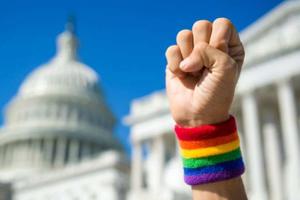The Equality Act Marks the Newest Phase of Ideological Conformity
COMMENTARY: The summary for the president’s proposed legislation does not adequately convey the bill’s ideological extremism and destructive potential.

I hate to say it, but the demand for ideological conformity by progressives in Washington has entered a new phase with the election of a president who is pushing through their agenda. The very existence of many faith-inspired service groups in America is threatened as never before. And that will a huge impact on the social landscape of the United States.
The Bridgespan Group recently published a study “Elevating the Role of Faith-Inspired Impact in the Social Sector.” It found “that faith-inspired organizations account for 40 percent of social safety net spending” in a sample of six cities of varying size and demographics. The faith that inspires the founding of houses of worship also aligned with “nonprofit organizations that seek to translate many of the religious doctrines of charity and caring for those most in need into professionalized services offered to communities across the country.”
All this is crucially important to low-income communities of color. Houses of worship in Black neighborhoods, for example, play an “outsized role in providing basic services,” notes the study, “because philanthropy works in nontraditional ways in Black communities.” A similar influence is found in Latino communities, especially among newcomers to the country. And in rural America, “congregations and religious institutions in rural communities often directly deliver critical support to those experiencing poverty.”
The Bridgespan Group encourages “philanthropy to more fully engage with faith-inspired impact in the social sector.” Its recommendation is in stark contrast to how these groups will be treated in our nation’s capital.
For starters, President Biden hopes to include two antagonists of religious freedom in his administration. Biden’s nominee for Secretary of Health and Human Services, Xavier Becerra, has waged a relentless battle as attorney general of California against religious and moral objectors like the Little Sisters of the Poor to Obamacare’s contraceptive mandate. Similarly, the president’s pick for Associate Attorney General, Vanita Gupta, called the Supreme Court’s recent support for an accommodation for the sisters a “license to discriminate.” For Becerra and Gupta, the zeal for universal acceptance of abortion doesn’t allow for dissent. It doesn’t matter that the elderly poor – those to whom the Little Sisters care – could be left out in the cold.
Meanwhile, the Democrat-controlled House of Representatives voted to pass The Equality Act, one of President Biden’s promised legislative priorities for his first 100 days in office. Passing with a final vote of 224-206, the act purports to prohibit discrimination based on sex, sexual orientation and gender identity in employment, housing, public accommodations, public education, federal funding and other areas of public life, but that summary does not adequately convey the bill’s ideological extremism and destructive potential.
Mary Rice Hasson, director of the Catholic Women’s Forum, soberly writes that under the Equality Act, “[t]here will be no safe spaces left for females. Support groups for mothers or sexual assault survivors would be forced to accept any male who feels entitled to join (based on ‘gender identity’). Girls and women (females) would no longer be free to shut the door and keep males out of our bathrooms, locker rooms or store dressing rooms. We would no longer be free to excel in and enjoy female-only athletics.”
The United States Conference of Catholic Bishops is concerned about the impact of the Equality Act on prohibitions on federal funding for abortion. Rightly so. As noted by Melanie Israel at the Heritage Foundation, the Equality Act’s new definition of “sex discrimination” includes “pregnancy, childbirth, or related medical condition.” Consequently, the Equality Act “would provide a basis to force taxpayers to pay for elective abortions.”
Another serious danger of the Equality Act is the proposed silencing of religious or moral objectors. Specifically, the bill states that “Religious Freedom Restoration Act shall not provide a claim concerning, or a defense to a claim under” nor “provide a basis for challenging the application or enforcement.”
The Religious Freedom Restoration Act (RFRA) bars the federal government from “substantially burdening” a person's exercise of religion, even if the burden results from a “rule of general applicability.” RFRA is an important protection for faith-based organizations because a religiously neutral law like the Equality Act can burden a religion just as much as one that was intended to interfere with religion. Walking back this important civil rights achievement under the guise of new anti-discrimination legislation is too clever by half. We can only hope that enough senators understand the perils of the Equality Act.
The tradition of Americans of faith ministering to the sick, hungry and downtrodden is older than the United States. As the Bridgespan report shows, it is still flourishing. But that tradition is vulnerable to political manipulation. Some faith-inspired social service groups are firmly progressive; others very conservative. Most lie somewhere in between. How will they react when the Biden administration presents them with a succession of litmus tests, none of which permit any deviation from progressive ideology? We are about to find out.
- Keywords:
- equality act, lgbt, lesbian, gay, protection, family, children
- biden supports equality act
















